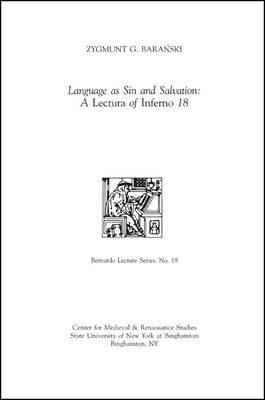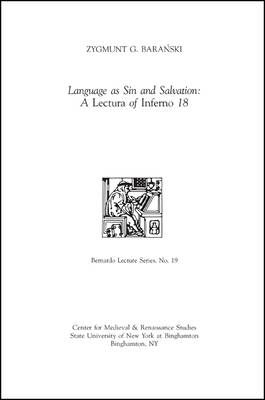
- Afhalen na 1 uur in een winkel met voorraad
- Gratis thuislevering in België vanaf € 30
- Ruim aanbod met 7 miljoen producten
- Afhalen na 1 uur in een winkel met voorraad
- Gratis thuislevering in België vanaf € 30
- Ruim aanbod met 7 miljoen producten
Language as Sin and Salvation: A Lectura of Inferno 18
Bernardo Lecture Series, No. 19
Zygmunt G BarańskiOmschrijving
Describes several key roles of Canto 18 in the structure of the Commedia.
Language as Sin and Salvation: A Lectura of Inferno 18 is the nineteenth in a series of publications occasioned by the annual Bernardo Lecture at the Center for Medieval and Renaissance Studies (CEMERS) at Binghamton University. This series offers public lectures that have been given by distinguished medieval and Renaissance scholars on topics and figures representative of these two important historical, religious, and intellectual periods.
With its sexual overtones and scatological references, Inferno 18 has caused considerable embarrassment to Dante scholars, who have tended to offer partial and reductive readings of the canto. This essay aims to establish Inferno 18's key role in the structure of the Commedia, not only in its function as "prologue" to one of the most original sections of Dante's afterlife, the richly stratified circle of fraud, Malebolge, but also as the canto in which the poet addresses two of the major controversial questions relating to the form of his great poem, namely, its status as "comedy" and its linguistic eclecticism.
Specificaties
Betrokkenen
- Auteur(s):
- Uitgeverij:
Inhoud
- Aantal bladzijden:
- 52
- Taal:
- Engels
- Reeks:
Eigenschappen
- Productcode (EAN):
- 9781438457383
- Verschijningsdatum:
- 1/11/2014
- Uitvoering:
- Paperback
- Formaat:
- Trade paperback (VS)
- Afmetingen:
- 152 mm x 229 mm
- Gewicht:
- 81 g

Alleen bij Standaard Boekhandel
Beoordelingen
We publiceren alleen reviews die voldoen aan de voorwaarden voor reviews. Bekijk onze voorwaarden voor reviews.











